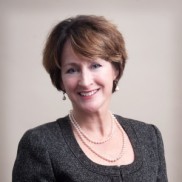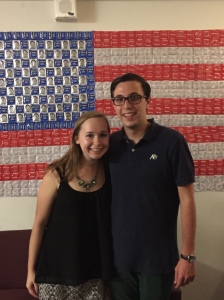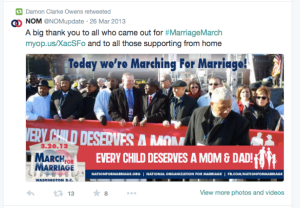H*yas for Choice’s rally Saturday in opposition to the Cardinal O’Connor Conference on Life received some criticism. Some people posted comments online and others beseeched us as we tabled and rallied outside. Instead of “rabble-rousing” in Healy Circle, some argued, some members should have gone into the conference, listened to the speakers, and “politely stated” our objections in Q&A sessions to gain a “richer experience”.
Members of the group may have independently attended the event, but HFC did not make a concerted effort to send individuals to ensure the group’s representation. Here is my attempt to justify that decision.

H*yas for Choice members outside Saturday’s conference
First, to co-opt the rhetoric and argumentation so often used to criticize HFC — e.g., “How egotistical to believe you need to provide information about sexual resources! The internet exists!”; “You do realize students can walk a few blocks and buy condoms from CVS, don’t you?” — the internet exists. These speakers do not exist in a vacuum. They have published books, given interviews, written articles, and teach at Georgetown. Cardinal O’Malley even has a regular podcast. Their opinions and values are not a secret, and neither are their bigotry and bias.
Indeed, HFC members posted an article every day leading up to the conference, laying out specific complaints about speakers at the conference by drawing on this information. To argue that I needed to go to the conference in order to fully understand the perspectives and arguments of these individuals is simplistic. In fact, this logic is dangerously close to blatantly contradicting other arguments HFC is used to hearing. “Why did you come to a Jesuit university if you disagree so strongly with their values,” we’re told time and time again. “What, exactly, did you expect? You made the choice to come here, so to protest the administration’s policies is to rage pointlessly against the machine.”
I can only imagine that if dedicated HFC members attended the conference and asked truly probing, substantive questions, the group would be met with the same criticisms: “Why did you come to the conference if you’re just going to aggravate the speakers and attendees? What did you expect was going to be said? Why bother challenging something you can’t change?” The argument that if I went, I might learn something is tinged with superiority — if only I could understand what anti-choice people are really saying, this argument seems to implore, there is no way I could remain so aggressively in favor of reproductive justice.
If the university — or rather, the students organizing the conference — truly wanted a richer experience for everyone, they would heed Hoyas United for Free Speech’s call for a more diverse population of speakers. It would not require abandoning their faith, or bringing in a radical choice activist. Catholics for Choice, for example, is based in Washington, DC. In fact, a speaker who challenges some long-held beliefs of members of the conference would truly uphold the ideal of the conference, “An End to Intelligent Debate?”
It is not the responsibility of H*yas for Choice to provide the sole dissenting voice, or to agitate hopelessly where they cannot and will not be heard. Perhaps it would be in the best interest of the concerned students and participants who wanted HFC to attend to meet the group halfway. Even if those students are unwilling to do so, the ultimate inequality of the situation is that if HFC had wanted to organize a similar conference, speaker, or even discussion, they would never have been able to use Gaston Hall and John DeGioia would never have sent the student body an email about it.
It’s an old argument but an important one: HFC does not have access to any university resources simply because Church officials do not agree with what they say. I’m not arguing the university shouldn’t have allowed the Conference on Life to occur, but I feel no need to attend a conference that was institutionally designed to not even take my beliefs into account. H*yas for Choice has a much more vested interest in protesting outside the event than in going in and listening to tired arguments and anti-choice rhetoric. The event is not live-broadcasted. The only people who are going to see the event are people who pre-registered beforehand and plan to give up an entire Saturday to attend. These dedicated people will not change their opinions because of some “pointed questions” we direct toward speakers. It’s a generous assessment of the average participant’s open-mindedness to even say they would objectively listen to our arguments, as we are expected to do by attending.
However, tabling outside the front gates captures the attention of a much larger portion of the Georgetown community, some of whom may not even be aware of the conference. Every person who stops and asks, “Why are you tabling here today?” has an opportunity to hear the group’s opinions that they otherwise would not have had. In terms of spreading awareness, tabling outside is an easy choice.
Despite the fact that HFC seems to constantly butt heads with the administration, that is not its purpose. Its purpose is to empower the students of Georgetown to have the information necessary to make sexual-health decisions for themselves, while spreading information and agitating for reproductive-justice issues. Visibility is a clear and integral part of that agenda.
To conclude: Was H*yas for Choice obligated to attend the conference in order to stage a legitimate protest? No. Was it a better use of HFC’s time to protest where we could reach a larger, more willing audience? Yes. Does this mean, if HFC students chose to attend, that they should not have done so? Of course not. However, I, for one, am not apologetic for the protest, and I am not apologetic for not attending the conference.
Emily Stephens (SFS ’17) is the secretary of H*yas for Choice. Her views do not necessarily represent the views of HFC as a whole.


















